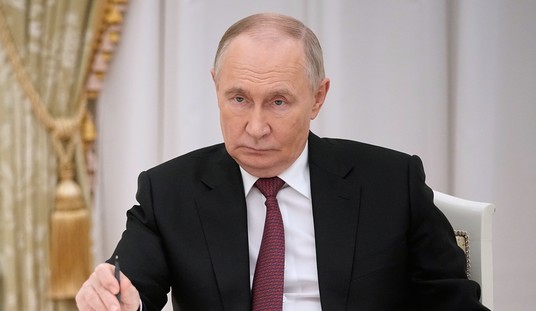The vote for secession went 89% in favor in Donetsk, and 94% in favor in Luhansk — at least according to those who organized the plebiscite. Pro-Russian separatists declared victory while most of the rest of the world scoffed at the irregular vote, conducted privately and with no controlling authority except for the separatist leadership forces — and even Russia began hedging:
Residents of two regions of eastern Ukraine turned out in significant numbers Sunday to vote in support of self-rule in a referendum that threatens to deepen divisions in a country already heading perilously toward civil war.
The wording of the referendum was vague, asking whether voters favored self-determination rather than outright independence or joining Russia. That meant some of those voting yes wanted more autonomy but not necessarily to split from Ukraine.
But the vote infuriated the Ukrainian government. The Foreign Ministry called it a “criminal farce” arranged by a “gang of Russian terrorists,” reflecting the government’s view that Russian agents are behind the breakaway movement. Many residents who oppose the separatist movement boycotted the vote.
Both the European Union and the Obama administration said they would not recognize the results of the balloting in the Donetsk and Luhansk regions, which they called illegal.
The Crimean plebiscite, which was absurd itself, at least had the mechanisms of civil authority conducting the referendum. Russia’s military hijacked that civil authority, but it at least had that much of a fig leaf. This was sheer nonsense — an “election” conducted by people holding a few government buildings, no registration checks, and reports of widespread voting fraud as people cast multiple ballots on behalf of “family.”
The Daily Beast’s Jamie Dettmer gives readers a glimpse into the rigged election, especially the run-up to the farce:
The procedures in the plebiscite managed by Denis Pushilin, a former casino croupier who is the co-chairman of the self-proclaimed Donetsk People’s Republic, followed the Kremlin’s house rules: the cynical strategies and plays of Russian-style “managed democracy,” not the electoral models outlined by organizations such as the United Nations or the International Foundation for Electoral Systems.
The separatists used all the now familiar techniques—including weeks of armed and thuggish intimidation, the abductions and murder of opponents, multiple voting, pre-filled ballot papers, adding names to an incomplete electoral roll and allowing anyone who turned up at a polling station with a Ukrainian passport in hand to cast a ballot.
In the circumstances the separatists were restrained with their referendum result: an 89 percent majority for secession and 10 percent against on a 74.7 percent turnout. A Soviet-style majority but not as unabashed as Crimea’s supposed 97 percent secession triumph in March.
In neighboring Luhansk, one of the poorest Ukrainian regions, where similar plebiscite tactics have been employed, the leader there, Valery Bolotov, at least had the decency to appear to go through the motions of actually counting votes, and so a result will be declared later Monday. No one is in doubt about which way that vote will go, either. Luhansk separatists hint their turnout was even higher yesterday—79 percent.
Nevertheless, now that the plebiscite delivered the predetermined results, the pro-Russian separatists want their independence immediately:
Vladimir Putin called for dialogue after the vote, but appears to be distancing himself at least a little from the process:
The Kremlin made it clear Monday that it has no intention to try to annex Ukraine’s eastern provinces after the controversial referendums where the majority of voters allegedly said they backed sovereignty for their regions.
In a statement, Russian President Vladimir Putin’s office urged the Ukrainian government to engage in talks with representatives of the eastern part of the country following Sunday’s vote. The cautious stance, which contrasted with Russia’s quick annexation of Crimea in March, appears to reflect Putin’s hope to negotiate a solution to what has become the worst crisis between Russia and the West since the Cold War.
The Kremlin also urged the Organization for Security and Cooperation in Europe to help broker talks between the central government in Kiev and representatives of the east.
OCSE announced that Putin would not recognize the vote, at least not formally:
The head of the influential East-West OSCE security organisation on Monday stressed that Russia had expressed “respect but not recognition” of the separatist vote in eastern Ukraine this weekend.
“Russia sees a need to take into account the different voices in eastern Ukraine,” said Swiss President and acting OSCE chief Didier Burkhalter.
“You have seen Russia’s response, that there is respect but not recognition to the referendum. There is no recognition of these results,” he told journalists.
Perhaps Putin has begun to wonder what else he can gain from this situation, and at what cost. Without recognition from Russia, the pro-Russian separatists may twist a little in the wind regardless of their so-called victory in their self-administered plebiscite. If Ukraine can manage to conduct a national election on time in less than two weeks, those results will easily eclipse yesterday’s effort.








Join the conversation as a VIP Member